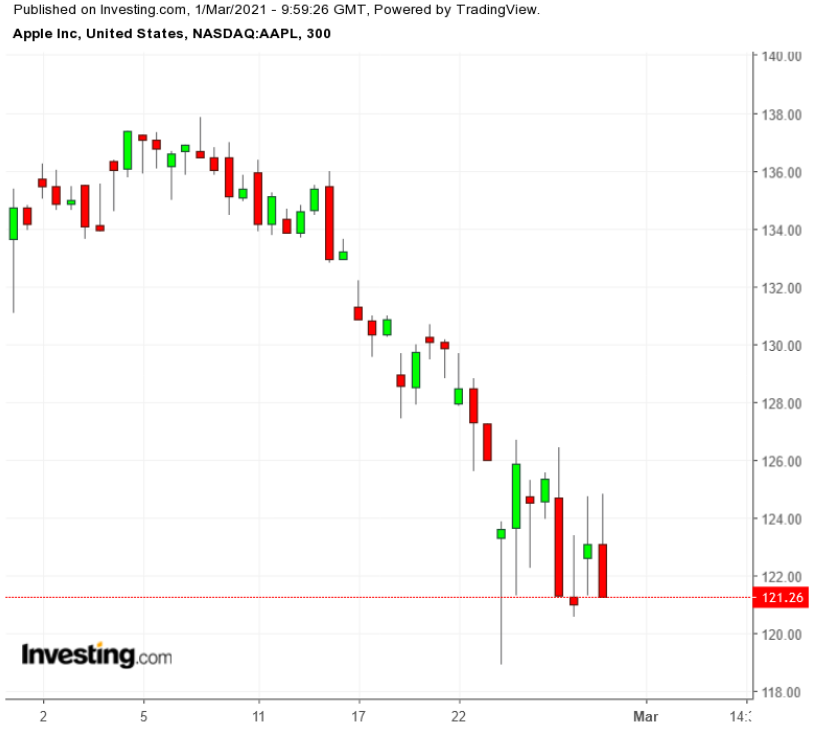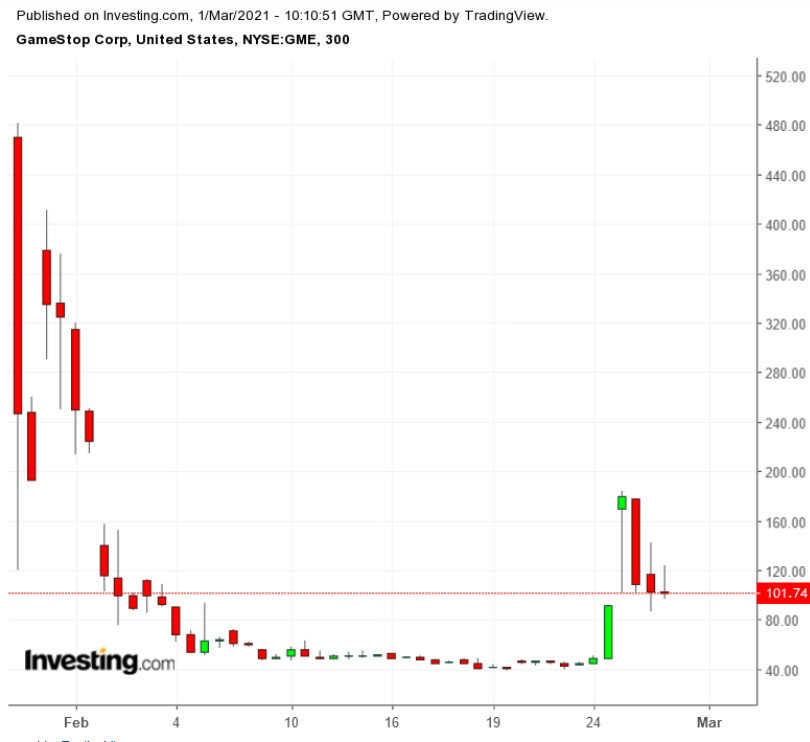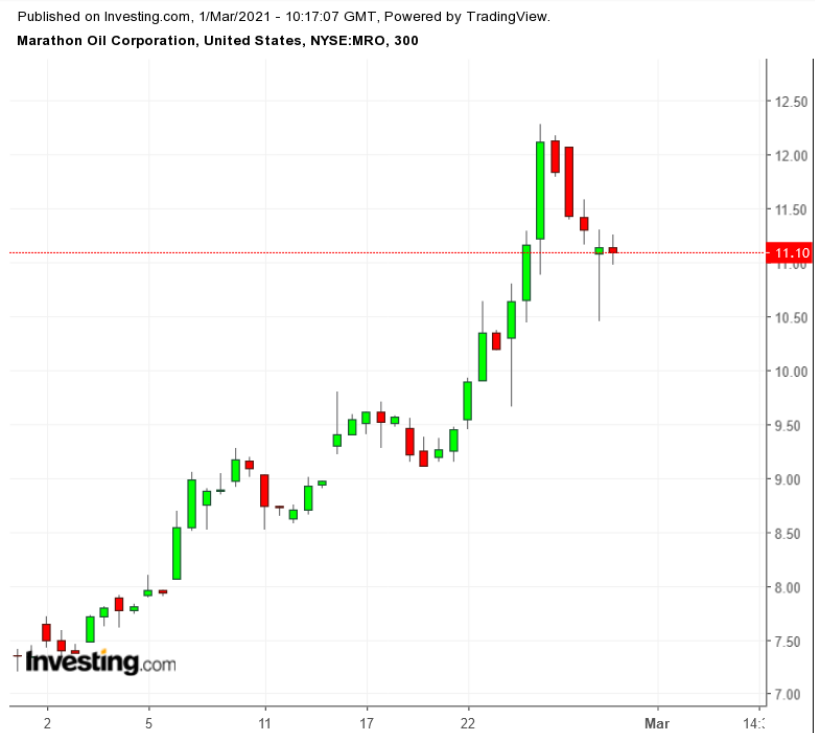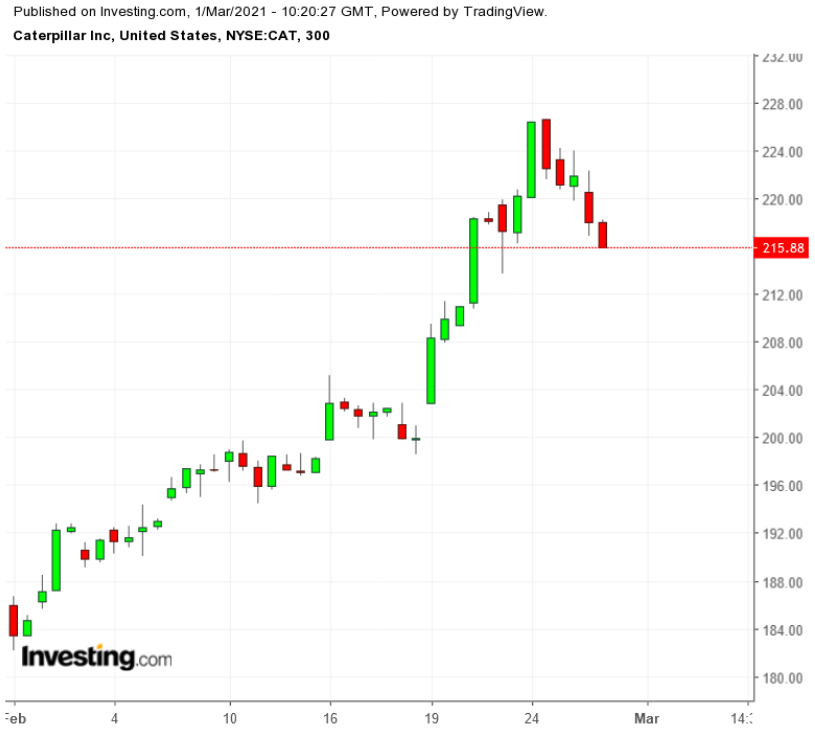This may shock, but, as a stock, Apple (NASDAQ:AAPL) was not an exceptional performer in February.

Maybe it will be great again. It is, after all, Apple. And it still has a market capitalization of $2.03 trillion.
The shares, however, fell 8.1% in in the month, the worst performer among the 30 stocks in the Dow Jones Industrial Average, 12th worst among the NASDAQ 100. AAPL shares were also among the 25 worst stocks in the S&P 500.
Former market darling Apple wasn't the only previously loved equity having a weak month. Investors sold Tesla (NASDAQ:TSLA), which was down nearly 15% in February; and Clorox (NYSE:CLX), -13.6% for the month. They even pushed down Moderna (NASDAQ:MRNA), whose vaccine has been a key weapon against the COVID-19 virus. Shares of the biotech frim fell 10.6% last month.
Oh, and then there's GameStop (NYSE:GME).

Shares of the video game and consumer electronics retailer fell 68.7% for the month after rising 151% last week alone and 1,625% in January.
One distinct change in investor sentiment has been emerging: a number of formerly beaten down stocks have now been embraced by investors including Marathon Oil (NYSE:MRO), Twitter (NYSE:TWTR), cruise-ship operator Carnival (NYSE:CCL), copper-and-gold miner Freeport-McMoRan (NYSE:FCX), Alaska Air Group (NYSE:ALK), Southwest Airlines (NYSE:LUV), Delta Air Lines (NYSE:DAL), and United Airlines Holdings (NASDAQ:UAL). All were up 30% or more in the month.
Modest Gains As Outlook Shifts
The net of the situation: stocks overall were modestly higher in February after mostly slipping in January. The Dow was up 3.2%, with the SPX adding 2.6%, and the NASDAQ Composite stumbling to a 0.9% gain.
The overall market performance reflects not so much weakness but rather, an equity driven narrative signaling an economic recovery is taking form or is already at hand and money is moving to better opportunities.
Vaccines that can protect against COVID-19 are becoming more available by the day in the United States and elsewhere. Johnson & Johnson's (NYSE:JNJ) COVID-19 innoculation was approved for use in the U.S. on Saturday.
The Biden Administration, in office barely a month, is working to get $1.9 trillion stimulus package passed.
Interest rates are starting to rise, reflecting demand for more credit.
Markets did become bumpy at the end of the month. Stocks sold off for several days when bullishness clashed with signs that bond traders may choose to make the recovery more expensive. The 10-year Treasury was trading at around 0.65% in early September. It's now at 1.5%, up about 59% since Dec. 31 and the highest level in about a year.
The major averages were all lower in the final week of February, with the Dow's 1.78% decline, its first after three weeks of gains.
Yields fell back slightly on Friday, but investors and the Federal Reserve will be watching the bond market closely. (Keep in mind: The 10-year yield even now is at historically low levels).
One could see the recovery mindset at work, particularly in two sectors, during the month.
Financial stocks. Shares in this group moved higher with interest rates and with the prospect of new financing deals. Banks like Goldman Sachs (NYSE:GS) and JPMorgan (NYSE:JPM) finished as the second- and fifth-best Dow performers (up 17.8% and 14.4%, respectively) as higher rates add to the bottom line.
There are also whiffs of deals in the finance industry. Smaller regional banks are seemingly ready to be bought out. People's United Financial (NASDAQ:PBCT), which operates in southeast New York and New England, has agreed to a $7.6 billion deal with M&T Bank (NYSE:MTB), the Buffalo banking company with operations across the Mid-Atlantic section of the country.
Energy shares. Oil prices were up 14% in the month as well as crossing $60 a barrel for the first time in a year. That set off a huge rally in energy stocks. Some of the price jump was due to expectation of more demand, but it also reflected an understanding between Saudi Arabia, Russia and the Organization of Petroleum Exporting Countries that low prices (below $20 in the worst of last March's market panic) aren't good for the cartel and its allies.
The Philadelphia Oil Service Sector Index (OSX) jumped 19.4% in February and is up 25% this year. The NYSE ARCA Oil Index (XOI) rose 21.1%. Exxon Mobil (NYSE:XOM) was up 21% in the month and 31% in 2021.
Chevron (NYSE:CVX), the last Big Oil stock in the Dow, jumped 18.1%, third-best among the Dow stocks.

Marathon Oil jumped 53.3%, leading the S&P 500.
The recovery theme spread to other commodities, especially copper. The metal jumped 15.4% in New York during the month, to $4.0925 a pound, its highest level since 2010. Freeport-McMoRan Copper & Gold shares jumped 26% for the month. Copper is a key material in many industrial products and thus is widely watched as an indicator of global economic conditions. Higher copper prices say the recovery is coming.
Alcoa (NYSE:AA), which produces raw aluminum, jumped 36.6% in February because investors are expecting more demand for the metal. Arconic (NYSE:ARNC), which fabricates raw aluminum into specialty products, saw its shares fall 13.1% because of rising material prices.

If materials stocks are rising, equipment makers followed along. Caterpillar (NYSE:CAT) was the top-performing Dow stock, up 18.1% on the assumption there will be infrastructure projects and plenty of road and building construction to boost jobs.
Recovery Bulls Boost Beaten-Down Performers
The recovery bulls are also pushing into seriously beaten down stocks, such as travel-related companies and airlines, whose businesses were crushed by the pandemic.
Wynn Resorts (NASDAQ:WYNN), MGM Resorts International (NYSE:MGM) and Las Vegas Sands (NYSE:LVS), three of the biggest gambling companies, all jumped more than 30%. Carnival and rival Royal Caribbean (NYSE:RCL) jumped 43% each.
Airlines shares rallied as investors see more seats filled over the year or so. Alaska Air Group, Southwest Airlines, United Airlines and Delta Air Lines were among the top 30 S&P 500 performers during the month.
In addition, Boeing's (NYSE:BA) 737 MAX has been recertified and is taking to the skies. Shares of the aviation giant jumped 9.2% in February.
Admittedly, airline stocks had been crushed in 2020 as passengers refused to fly anywhere. Alaska Air shares were off 22% in 2020—after falling nearly 58% in the first quarter alone.
Lastly, car-rental company Avis Budget Group (NASDAQ:CAR) jumped 34.4% in February, tops among stocks in the Dow Jones Transportation Average (DJT). Clearly, travelers are in need of transportation out of airports.
Potential Market Catalysts
If economic conditions suggest a recovery is at hand, several factors could affect the market going forward:
- Inflation fears could become more than just chatter among market pundits. That will depend on the Fed and Chairman Jerome Powell, who has said repeatedly—as recently as this past week—that getting the economy moving again is his top priority. It is too soon to say if Powell will be able to achieve his goals, but job growth, a higher minimum wage and a stimulus package from the government are ideas he has explicitly endorsed.
- The recovery is not as robust as hoped. Massive sectors were affected by the pandemic, especially travel and leisure, restaurants and retailing. Their recoveries will take time. The jobs report due Friday will be important. A consumer confidence report last week from the Conference Board suggested much caution. Ultimately, the recovery depends on Congress and the Biden Administration. Many Democrats believe they were not aggressive enough in moving the economy out of the 2008-2009 financial crisis.
- There's a side issue to watch as well: a shortage of computer chips used in everything from personal computers to automobiles and microwaves. If a product needs a chip to work, and the supply is constrained, that could hold back production.
- Stocks become overvalued. U.S. stocks became very overvalued at the end of 2019 and early 2020 and needed a catalyst to trigger a pullback. That proved to be the pandemic. The NASDAQ also moved into overvalued territory at the end of 2020 and into January. Finally, a pullback occurred.
- The free-for-all over the stock prices of companies like GameStop, AMC Entertainment (NYSE:AMC) and stereo headset company Koss (NASDAQ:KOSS) fueled by Reddit and other social media platforms could potentially get out of control and destabilize the financial system. Not likely, but it bears watching. Koss, for example, traded between roughly $1 and $2 for most of 2020. Then, suddenly, the stock was bid up to $126.00. It's now at $16.71.
A note about the market as of Friday. The gaps between 52-week highs and lows for most stocks is about to narrow. That's because markets bottomed on Mar. 23, 2020. As of Friday, Apple's 52-week high of $145.09, reached on Jan. 25, was 172% higher than its 52-week low of $53.14, reached on Mar. 23, 2020. If the gap narrows without the 52-week high increasing, investors might be disappointed.
(For the record, GameStop's 52-week high of $481.99 is 18,654% higher than its 52-week low, reached on Apr. 3, 2020.)
The bottom line regarding the market close on Friday is that conditions for stocks to move higher are basically in place. There are risks for sure, however: from the economy, from the market internals and from the political environment.
